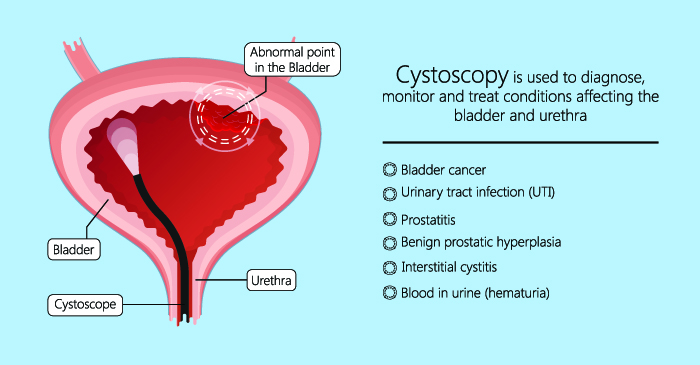Cystoscopy Surgery in Karol Bagh, Delhi
Cystoscopy is a procedure that enables a doctor to examine the lining of your bladder and urethra (a tube that carries urine out of the body). A cystoscopy is usually performed for the diagnosis of blockages, enlarged prostate gland, non-cancerous growth and any problems with the ureters.
What is cystoscopy?
During cystoscopy, a cystoscope, a thin tube with a camera and light at the end, is inserted through the urethra and then into the bladder so that the doctor can look inside the bladder. A cystoscopy is usually performed to understand the reasons for blood in urine, frequent urinary tract infections, overactive bladder and pelvic pain. Additionally, a cystoscopy also helps diagnose other medical conditions such as bladder stones, cancer and tumors.
To know more, consult a urology doctor in Delhi or visit a urology hospital near you.

Who qualifies for cystoscopy?
A person needs to go for cystoscopy when an abnormality of bladder or urethra is identified in non-invasive tests such as X-ray, magnetic resonance imaging (MRI) or computed tomography scan (CT). Cystoscopy helps medical practitioners to determine the cause of the following medical conditions:
- Blood in urine
- Urinary retention
- Recurrent bladder infections
- Painful urination
- Pelvic pain
- Frequent urination
- Inability to urinate
Why is cystoscopy performed?
A cystoscopy is usually performed to:
- Diagnose the cause of frequent urination
- Diagnose bladder diseases such as bladder stones, bladder inflammation and bladder cancer
- Remove small tumors
- Diagnose enlarged prostate
- Diagnose the reason for blood in urine, incontinence, overactive bladder and pain while urinating
Request an appointment at Apollo Spectra Hospitals, Karol Bagh, New Delhi.
Call 1860 500 2244 to book an appointment.
What are the different types of cystoscopy?
- Standard rigid cystoscopy
- Flexible cystoscopy
- Suprapubic cystoscopy
What are the benefits?
Some of the benefits of cystoscopy are:
- Minimally invasive procedure
- Quick recovery
- Relief from pain
- Reduces discomfort
What are the risk factors?
Some of the potential risks of cystoscopy are as follows:
- Swollen urethra - This condition makes urination difficult. Thus, if you are unable to urinate after the procedure, then you should immediately contact your doctor.
- Infection - In some of the rare cases, germs enter the urinary tract and cause infection. Some of the symptoms of an infection are fever, lower back pain, nausea and strange-smelling urine.
- Bleeding - Serious bleeding after the procedure can be a major concern.
- Persistent pain in the stomach
- High fever
- Red blood clots in urine
Some of the prominent side effects of cystoscopy are significant bleeding, urinary retention, incontinence and blood clots in urine.
Ureteroscope and cystoscope have cameras and light at the end. The only difference between these two devices is that a ureteroscope is longer and thinner, which helps see detailed images of the linings of kidneys and ureters.
Cystoscopy is not usually painful when it is done under general anesthesia. However, you may have a burning sensation or would feel like urinating when you have been given local anesthesia.
Cystoscopy usually takes around 15 to 20 minutes, and if the procedure is performed under local anesthesia, then there is no need to get hospitalized. However, if you have any other surgery scheduled along with cystoscopy, then hospitalization is required.
Symptoms
Our Top Specialities
NOTICE BOARD
CONTACT US
CONTACT US
 Book Appointment
Book Appointment


.svg)
.svg)
.svg)
.svg)








